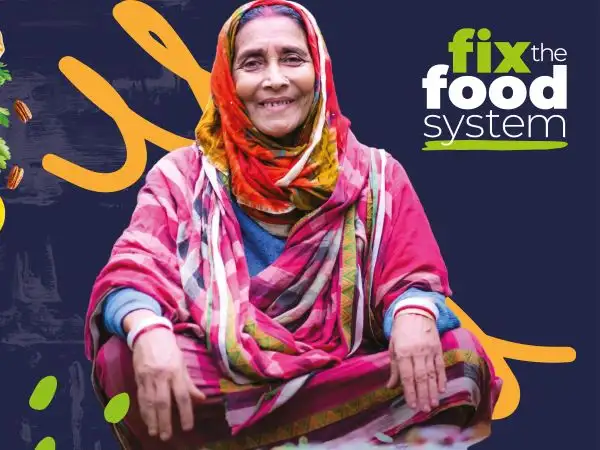Prayers on food and hunger
Pray with us for a fairer global food system where everyone has enough.


Alexander was among a group of young adults from CAFOD who were given access to the COP26 green zone during their stay in Glasgow.
We all need to use our voices to demand change. Many communities cannot wait.


Alpona is the leader of an eco-village in Bangladesh.
Alexander Ugoh, 19, a young campaigner who joined the COP26 CAFOD delegation, tells us why our new Fix the Food System campaign is vital to addressing the climate crisis.Fix the Food SystemAlexander Ugoh, 19, a young campaigner who joined the COP26 CAFOD delegation, tells us why our new Fix the Food System campaign is vital to addressing the climate crisis.
Attending the COP26 climate talks in November of last year was the pinnacle of many campaigning highlights that I’ve had with CAFOD. From solidarity actions standing with the Rohingya communities, to joining the Time Is Now mass lobby and calling on my MP to commit to urgent climate action, I know campaigning works – and it’s now more important than ever.
In Glasgow, we marched, prayed and raised our voices for climate justice, standing up for the most vulnerable communities who have done the least to cause the crisis but who are suffering the most from its impacts. My hopes were lifted. It really did feel like this could be the moment that we get meaningful change!
Many promises were made at COP26 by governments and business leaders, but now is the time to hold them to account and ensure these were not just empty words.
Take action to fix the food system
One of the leading drivers of the climate emergency is our food system, accounting for more than a third of global annual greenhouse gas emissions. Believe it or not, research suggests the food industry produces almost 19 times more carbon dioxide annually than commercial aviation!
The way we grow, process and consume food is not fit for this era of climate crisis. Whilst forests soak up greenhouse gases, more than half of the world’s deforestation takes place because of commercial agriculture, dominated by a few big businesses.
As much as 80 per cent of all the soya grown across the world is fed to livestock. And here in the UK, in 2019 we imported 3.5 million tonnes of soya beans, with over half of that ending up in chicken feed, while around 800 million people went hungry.
This shocks me. I think of how often we can take food for granted, and what a difference it could make if we collectively made changes to this system and to our diets.


Alexander was among a group of young adults from CAFOD who were given access to the COP26 green zone during their stay in Glasgow.
Young people like myself have a key role to play in pushing for alternatives to the current global food system. We see the destruction of our common home in the name of short-term profit, and the injustices faced by so many communities who have been co-opted into a system of exploitation.
We are called to act now in solidarity with those who face hunger – a problem that should be of the past – as well as on behalf of the generations to come whose future depends on the health of our soil, water, air and fragile ecosystem.
It doesn’t have to be this way. There are other ways of producing food where farmers can make their own choices about what they grow and be supported to produce their own food in ways that are good for people, for the land and for the climate.
While on CAFOD’s Young Leadership Programme, I was inspired by the work of CAFOD’s partners who are pioneering some of those alternatives. But right now, it’s large-scale industrial agriculture, dominated by a few big agribusinesses, that receive the most support, despite the fact that they’re already profiting at the expense of deforestation and toxic pesticides. Even UK government aid that’s spent on agriculture goes mainly to supporting big commercial agro-business, as opposed to alternatives that put local communities first, tackle the climate crisis and restore our common home.

Pray with us for a fairer global food system where everyone has enough.
Catholics across England and Wales have sent messages urging the government to rethink our global food system.